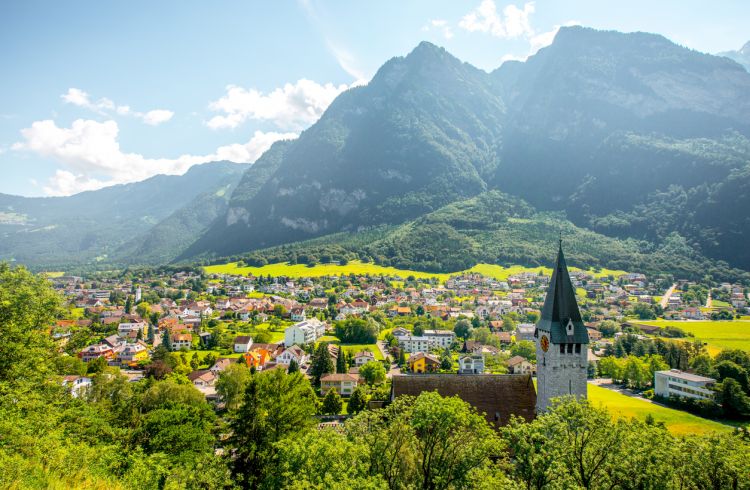Is Liechtenstein Safe? Laws, Crime and Health Tips
Liechtenstein is a beautiful alpine country sandwiched between Switzerland and Austria. It has very little crime. but there are a few things to know to keep safe while traveling here.
 Photo © Getty Images/RossHelen
Photo © Getty Images/RossHelen
Towering mountains, pretty alpine flowers, fairy tale like castles and quaint medieval villages, Liechtenstein is worth a visit for its local culture and scenery. It's that small, you can ride a bike from north to south in a couple of hours. Just don't pick the flowers.
It's culturally German, economically Swiss. Everyone speaks German and French and probably English too, just don't call them Swiss, German or Austrian; the people of Liechtenstein are proud and rightly so.
Crime and local laws
Other than falling foul of the principality's local laws, there are not many risks to your safety.
Crime is virtually non-existent in Liechtenstein, that it seems like the governors of this tiny Alpine nation have been making up laws just so they can catch someone doing something wrong!
In the resort of Malbun, there are fenced off areas and if you stray over the fence to pick a flower for yourself or your lover, you could get slugged by a 500 Swiss Franc fine.
Don't even think of dropping a piece of litter, you'll cop another fine there too.
If you plan to get out on the road, make sure you have a warning triangle and safety vest with you in the car in case your car breaks down. It's also compulsory like many places to use snow tyres in winter. Dipped headlights are compulsory at all times while driving in Liechtenstein.
The only real hazards you may encounter on the roads are drunk drivers and in winter, the icy conditions. It's a good idea also to soak in the scenery as you drive, speed limits are monitored by cameras and the fines can put a nasty dent in your holiday savings.
Etiquette
Liechtenstein is a catholic country so on Sundays not much is open unless it's tourist oriented.
Avoid talking politics and the royal family; the prince is very much loved amongst his people.
Punctuality is a big deal in Liechtenstein so if you are going on a tour or meeting someone, don't be like the rabbit in Alice in Wonderland.
Health issues in Liechtenstein
Medical treatment in Liechtenstein is of a high standard although if you do need serious medical attention it's likely you will be transferred across the border into Switzerland.
The local tap water is generally safe to drink, though check with locals if you are staying in different areas as taste can vary.
Liechtenstein has few health concerns, but the major one is staying safe and healthy in the alpine areas. Lichtenstein is extremely mountainous and snow blankets the nation all winter. Hiking is a great way to see some of the country's most beautiful places particularly in the summer with around 250 miles of networked trails. Locals and tourists alike get out to stretch their legs and enjoy the fresh mountain air. There are some trails open during winter but travelers will need to check with authorities for conditions and trail status.
However it can be dangerous if you get caught out or are not adequately prepared which happens to many hikers each year. Check weather reports and with authorities in case of closures or other issues. Always make sure you are dressed for the conditions, have adequate food and water, stick to the trails. Most importantly, try to avoid hiking alone.
Always tell someone where you are planning to go whether you are hiking solo or in a group. Keep an eye on the weather and turn back if the weather is starting to look inclement. There are several mountain hut accommodations in Liechtenstein however you will need to book them in advance so you don't get stuck sleeping on the floor!
If you have an accident or someone else does, you can contact mountain rescue on 1414 and ambulance on 144
In summer, you will also need to watch out for ticks.
They can transmit infections or illnesses such as Lyme disease or tick-borne encephalitis (TBEV).
There is a vaccination against tick-borne encephalitis and it may be worth getting it if you plan to spend time outdoors in the forested and mountainous areas. If outdoors, it's a good idea to wear long clothing, a hat and insect repellent to protect yourself from ticks. Tuck your pants into your socks and wear gaiters if you have them. Stick to the marked trails as much as possible.
Most importantly, check your body for ticks after having been outdoors and immediately seek medical assistance if you have any physical symptoms which can include: a rash at the bite site or all over the body, headache, nausea, muscle-joint stiffness and aches, fever and fatigue.
Simple and flexible travel insurance
You can buy at home or while traveling, and claim online from anywhere in the world. With 150+ adventure activities covered and 24/7 emergency assistance.
Get a quote
No Comments